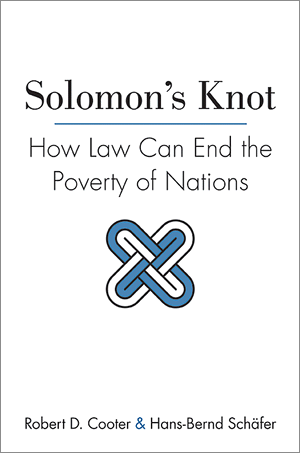Solomon’s Knot and Gray Markets
Solomon’s Knot: How Law Can End the Poverty of Nations has received less attention than some of other recent big books on development but I found it to be rich in institutional detail, wisdom and practical advice. The authors, Robert
 Cooter and Hans-Bernd Schafer, are law professors and as befits their expertise they spend less time on why institutions differ and more on the details of how institutions differ–there is more in Solomon’s Knot, for example, on issues like relational finance, venture capital, joint-stock companies, contract law and bankruptcy law than in other books with a similar theme.
Cooter and Hans-Bernd Schafer, are law professors and as befits their expertise they spend less time on why institutions differ and more on the details of how institutions differ–there is more in Solomon’s Knot, for example, on issues like relational finance, venture capital, joint-stock companies, contract law and bankruptcy law than in other books with a similar theme.
Here is one idea that I had not previously considered, should judges enforce contracts in the gray market?
…businessmen and workers must violate many regulations in order to get things done, especially in poor countries. Thus a builder in Cairo violates building restrictions, a worker and employer in Brazil evade employment taxes, and a manufacturer in Russia runs a factory without a permit to do business.
Throughout the world, much of the economy operates in the “grey market”…a survey of 145 countries estimated that gray
markets activities produce between 30% and 40% of GNP (gross domestic
product). The gray market’s share of total employment is even higher than its
share of GNP.
Judges in many countries will not enforce contracts in the gray market considering them null and void due to the extra-legality. Even when the contracts might be enforced, participants fear that they will be otherwise punished if they make use of the legal system. Cooter and and Schafer argue, however, that such contracts should be enforced and a strict separation be kept between law and regulation. They point to Germany as an example:
…Unlike many developing countries, German legal doctrine and practice avoid this
result. German regulatory violations seldom void contracts, and German
prosecutors seldom act on regulatory violations revealed in a civil trial. Thus a
gardener in the German gray market who does not pay taxes can sue an
employer for unpaid wages without fear of triggering regulatory prosecution.
And a customer who buys a restaurant meal at an hour when law requires the
closing of restaurants still has to pay his credit card bill. The same applies for a
construction contract that violates zoning regulations, or a credit contract that
violates banking regulations. Although seldom discussed in constitutional law,
separating the civil courts from the regulators and police is an important part of
the separation of powers, especially in countries with a large gray market.
The case for separation is strongest for gray markets because the underlying acts are not per se illegal but could the argument be extended even to black markets? Jeff Miron and Miron and Zweibel (JSTOR) argue that one reason that drug prohibition increases violence is that when courts are unavailable, violence becomes the least costly method of dispute resolution. What Cooter and Schafer suggest, however, is that it is at least conceivable to have a situation where the act remains illegal but the actors can resolve disputes in court. Imagine, for example, a drug user taking a dealer to court for cutting the product or a prostitute suing a john for not paying.
It seems naive to expect that we would enforce a rule not to use information from civil court to prosecute illegal behavior. Yet there is a precedent; if a police officer obtains evidence illegally, even without intent, then we throw such evidence out of court. A very strange incentive system. Nevertheless, if we can let murderers go free because the evidence against them was obtained illegally then perhaps we could also let drug dealers bring their contract disputes to court without on that basis prosecuting them for drug dealing.
Addendum: Here is a good interview of Cooter by Nick Schulz and an excerpt from the book.